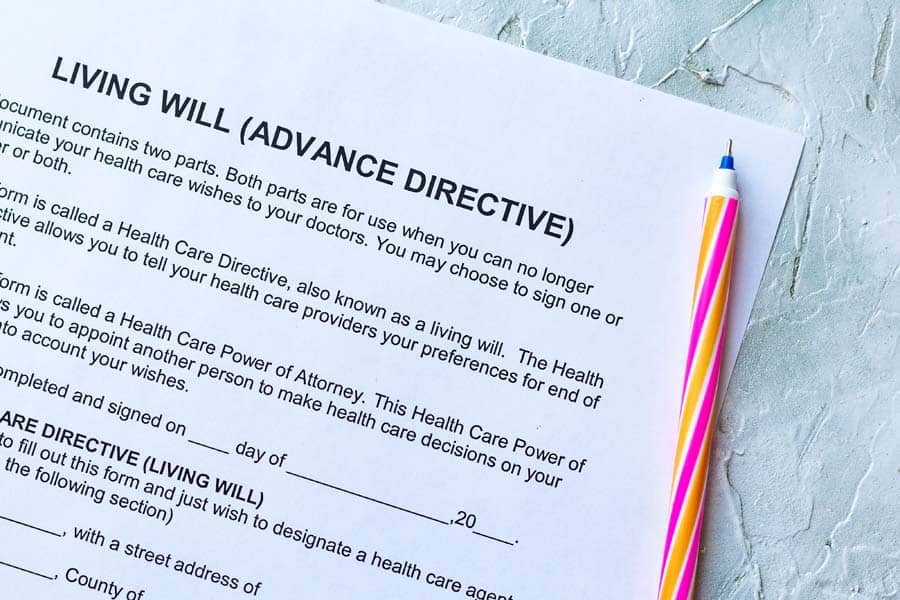Please view our updated COVID-19 guidelines and visiting procedures →.

No matter your age or health status, a properly executed Advance Directive is essential to assure you receive healthcare that aligns with your beliefs and wishes. Even the young and healthy may find themselves in an unanticipated medical situation in which an Advance Directive is critical.
An Advance Directive is a legal document that allows you to maintain control over the healthcare you receive should you be in a circumstance where you are unable to communicate your wishes to your healthcare providers.
Which Advance Directive to choose depends on your wishes, your understanding of the limitations of each type of Advance Directive, and your state of health. First, let’s review the healthcare representative. Before we do, though, some confusion about this form of Advance Directive needs to be cleared up. In addition to the term “healthcare representative,” you may also hear the phrases “healthcare agent,” and “durable power of attorney for healthcare.” Each of these is essentially the same, and Connecticut officially replaced the latter two terms with the former on October 1, 2006. In keeping with this, I will use “healthcare representative” going forward to refer to this form of Advance Directive.
A healthcare representative is legally designated by an individual to make their healthcare decisions should they no longer be able to communicate — for example, they are unconscious and cannot talk or write. In contrast to the other types of Advance Directive, a healthcare representative offers the most flexibility in directing doctors and other healthcare workers no matter the now-incapacitated person’s medical circumstance. A Living Will cannot be honored unless specific criteria are met and may not allow medical providers reasonable flexibility in the care they provide (discussed below). A Connecticut MOLST is also very specific, and is only legally used for people with serious illness (also discussed below).
Designating a healthcare representative is easy and does not require a lawyer or Notary Public. Your healthcare representative should be a person — many people designate a good friend -- who will follow your wishes for care with a lesser likelihood of being so emotionally involved as to find it difficult to do as you have instructed – such as a wrenching decision to discontinue life support. This is one reason why a friend may be a better healthcare representative than a close – and more emotionally involved -- family member such as a spouse, parent, or child.
Once you have decided who to designate as your healthcare representative – and once they have agreed to take on this important role (an alternate representative may also be designated should your primary representative be unavailable or decline to make decisions), it is imperative to have a conversation with them about what your wishes would be in a variety of circumstances. For example, some people may want more aggressive care should they become ill with a life-threatening though potentially curable illness than they would if they had a terminal illness with few treatment options and a lesser likelihood of recovery. However, it is impossible to anticipate all medical eventualities— I have tried— and one advantage of the healthcare representative is that he or she has freer rein to direct care in the spirit of your wishes – regardless of your exact medical circumstance -- than is allowed by a living will or MOLST.
To complete your legally enforceable healthcare representative paperwork, which requires two witnesses but again does not require a lawyer or a Notary Public, download a detailed PDF outlining Advance Directive procedure in Connecticut (including healthcare representative, Conservator of the Person, living will, and anatomic donations. MOLST cannot be completed with an online form – see below).
It is worth noting that you must be able to understand the consequences of your decisions to designate a healthcare representative. People who are significantly cognitively impaired, from dementia, for example, and are unable to direct a healthcare representative sensibly and reasonably, are not eligible. Likewise, someone with impaired consciousness is also not eligible. This is why it is important to choose one before becoming seriously ill.
For the sake of completeness, if you designated a durable power of attorney for healthcare in Connecticut before October 1, 2006, that person has the same medical decision-making rights as a healthcare representative. If you designated a healthcare agent – not a representative -- prior to October 1, 2006, that person may only make decisions about withdrawing or withholding life support, not all healthcare decisions. And if you don’t have a legal Advance Directive in Connecticut, healthcare providers will look to your next of kin for decisions. In order of preference, these are your spouse, adult child, and parent -- or other relatives if they are not available.

All in all, and especially considering the difficulty healthcare providers will have following instructions if family members disagree about the care you should receive, these factors make it clear that it makes far more sense to simply designate an up-to-date healthcare representative and to do it now.
A Connecticut “Conservator of the Person” is an individual, often a lawyer, appointed by a Probate Court and responsible for healthcare decisions for someone who is permanently unable to care for, and communicate their healthcare decisions – such as someone with dementia. Usually, Conservators are assigned to people who have not designated a healthcare representative and are no longer capable of doing so. While a Conservator is empowered to make all healthcare decisions, their role usually relates to custodial needs— such as admission to a nursing home— although they may also make decisions about specific medical interventions. If someone with a court-appointed conservator already has healthcare representative, having designated one while they were still able, the decisions of the healthcare representative about day-to-day medical care have more authority than those of the Conservator, unless the Probate Court disagrees.
These instructions require no further input from you, a healthcare representative, a Conservator, or anyone else to be followed by healthcare providers. The Connecticut Living Will provides instructions about your wishes regarding cardiopulmonary resuscitation—or CPR — mechanical ventilation (such as a respirator), artificial nutrition and hydration, (such as tube feeding), and any other specific medical requests you may choose (such as intravenous antibiotics). The Living Will, however, is very specific as to the medical circumstances in which healthcare providers can follow its directives. These include suffering from a terminal illness, permanent unconsciousness, permanent coma, or persistent vegetative state. One potential problem with the Living Will is that reasonable people may disagree on the definition of these entities. One medical provider may believe a condition is terminal, while another may feel that there are still medical treatment options. Likewise, there may be disagreement as to whether a state of unconsciousness or coma is permanent, and how exactly to define “persistent vegetative state.” Recent research in people believed to have no conscious awareness of their surroundings— part of the definition of persistent vegetative state— has shown that some patients may have more awareness than others. This may complicate matters should there be disagreement as to whether you are in persistent vegetative state. I have seen more than one situation in which it was clear that a grievously ill patient would have wanted to be taken off life support but the wording of their living will tied the hands of their healthcare providers. A healthcare representative, on the other hand, can make decisions regardless of these uncertainties, although they should not stray too broadly from your expressed wishes. For example, someone might instruct their healthcare representative to decline further medical interventions – or to stop life support -- should the likelihood of their being indefinitely and seriously neurologically impaired be high, regardless of whether they are terminally ill, “permanently” unconscious, or suffering what may or may not be persistent vegetative state. This decision is up to each individual, and is important to convey to a healthcare representative.

Technically, MOLST is not an Advanced Directive because it specifies the medical treatment that is desired at the time the form is complete, not at some imaginary future time under some unknown medical circumstance. MOLST requires the presence of an “end stage, serious, life limiting illness” or an “advanced chronic progressive frailty condition,” is usually completed by people at significant risk of hospitalization with the risk of death in the very near future, and is very specific as to desired interventions, such as different kinds of ventilator support, ICU care, IV fluid and nutrition, and others. MOLST requires the signature of and counseling by a MOLST trained and certified physician, advanced practice registered nurse (APRN), or physician assistant, and the original lime-green form must be presented for it to be valid. More information about MOLST.
Again, a valid MOLST requires you be counseled by a trained and certified MD, DO, APRN, or PA, and have a signed, original lime green MOLST form. Counseling is imperative -- I have more than once seen incorrectly completed MOLST forms – requesting, for example, both comfort-measures only and life support – unnecessarily complicate care.
The bottom line? At the very minimum, if you are able to read and understand this blog, get to work on designating your legal healthcare representative right now.

As a not-for-profit, we depend on generous donors to help us provide customized services and therapies that aren’t completely covered by Medicaid, Medicare, or private insurance.
Please make a gift to help us sustain the highest standard of care.
Admissions may be scheduled seven days a week.
Call our Centralized Intake Department: (203) 315-7540.